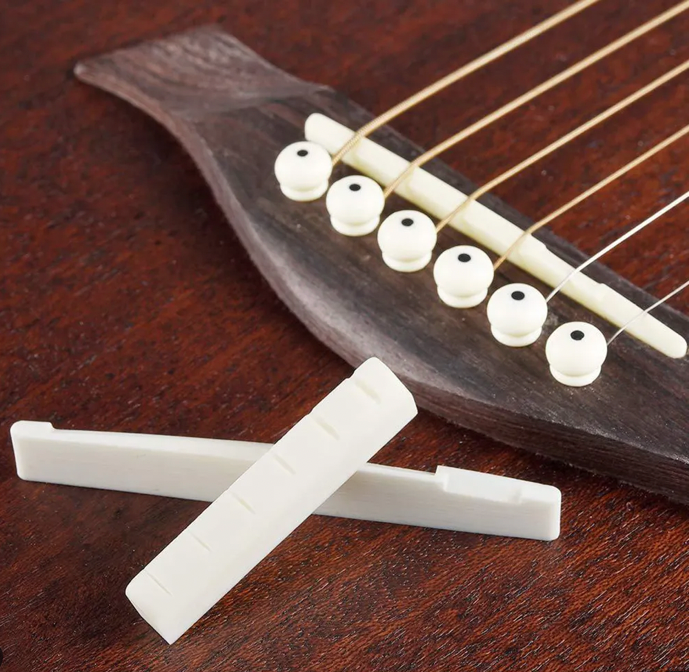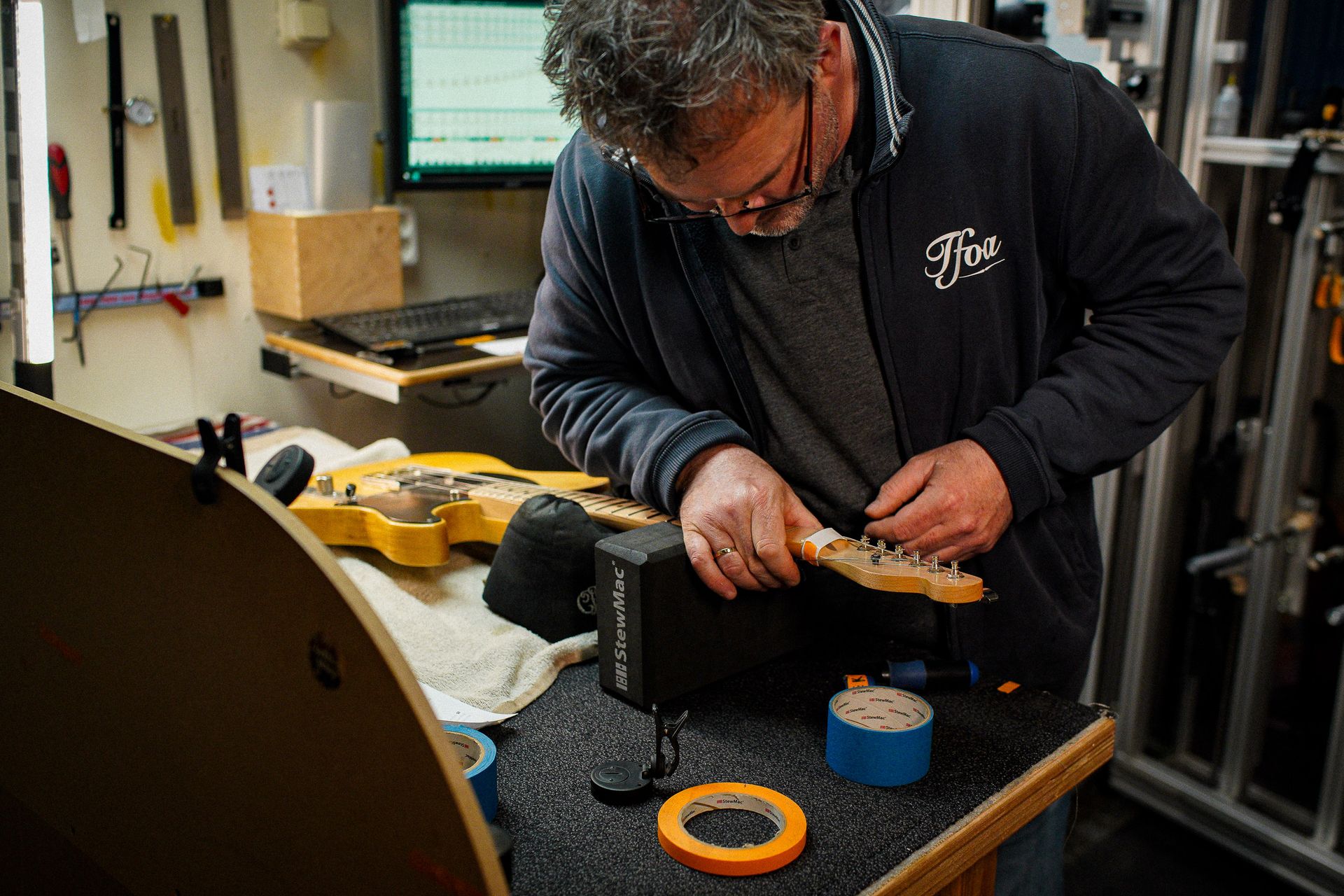Our Services

Restringing
Besides keeping your guitar clean, this is the most common maintenance chore: changing strings! To make sure your guitar stays in tune, it is important that this is done properly. But when should you replace strings, and how? And which strings are best? Our luthiers know the answers to all these questions and will be happy to advise which string thickness, the ‘gauge’, best suits your playing style.
In our workshop, we not only provide your instrument with a fresh set of strings, but we also oil the fretboard and polish the frets beautifully again. So your instrument will shine again!
Price List Replacing Strings
Restringing
- 4-6 Strings from €35,-
- 8-12 Strings from €65,-
- Floyd Rose from €75,-
- *Prices do not include strings
- All prices do not include a ‘small material’ fee of €2.25.
Pickups & Electronics
Pickups come in many different shapes and sizes. For electric guitars, for example, you have countless types of single coils, P90s and humbuckers. But for acoustic guitars too, the range is huge!
For example, you can opt for a ‘transducer’ pickup, of which the K&K Pure Mini is perhaps the best-known example. Another common type of transducer pickup is the ‘piezo’, such as the LR Baggs Element and Fishman Infinity. But you also have pickups that use a small microphone to pick up the sound. The LR Baggs Lyric is a perfect example. And as if this doesn't give you enough choice stress, there are also pickups that combine several types. An incredibly popular pickup is the LR Baggs Anthem that merges a microphone with the piezo of their Element pickup.
Our luthiers have seen them all by and can install or dismantle them with ease. The choice is yours! But don't worry, our Fellows are here to help you choose the right pickup.

Price List Pickups & Electronics
Pickups/Electronics
- Installation LR Baggs Anthem €175,-
- Installation LR Baggs Lyric €125,-
- Installation K&K Pure Mini €115,-
- Installation K&K Trinity €149,-
- Installation Electric Guitar Pickups from €85,-
- Replace Potmeter(s) from €49,-
- *Price does not include parts
- All prices do not include a ‘small material’ fee of €2.25 and any additional charges for new strings.
Nut & Saddles
Paul Reed Smith often says: ‘Everything that touches the string is God’. In this respect, the nut and bridge saddle are the most important places on a guitar. On a properly playable guitar, the slots in the nut are cut just right and the strings do not slide off the saddle.
If the saddle or nut gets too low, you will notice it both in the playability and sound of the guitar. Sometimes they are raised slightly to postpone replacement, but to play carefree, we recommend having these parts replaced on time.
With us, it is possible to choose between a bone or Tusq saddle. In general, a bone saddle gives a warmer sound, while Tusq gives a more clean and bright sound. Let us know your preference and the luthier will get to work for you! In the process, we also give the guitar an immediate setup so it's ready to play again. And did you know we also offer a PLEK Setup where the nut is replaced with extreme precision? Read more about our PLEK Setups here .

Price List Nut & Saddles
Nut & Saddles
- Bone or Tusq Saddle Replacement from €145,-
- Bone or Tusq Long Saddle Replacement from €215,-
- Drop-In Saddle Replacement from €105,-
- Bone Nut Replacement from €175,-
- **Includes Setup
- All prices do not include a ‘small material’ fee of €2.25 and any additional charges for new strings.
Upgrades
Besides maintenance work to keep your instrument in optimal condition, we also often help with upgrades. For example, do you want different tuning machines on your guitar? Other electronic circuits? Or always wanted a Bigsby on your guitar? Our luthiers will take care of it for you!
Depending on the instrument and the upgrade you want, we will give you a personalised quote. So contact us soon to make your upgrade a reality!

Price List Upgrades
Upgrades
- Replacement Tuning Machines Price on request
- Tremolo System Installation/Replacement Price on request
- Install/Replace Tailpiece Price on request
- All prices do not include a ‘small material’ fee of €2.25 and any additional charges for new strings.
How Do I Keep My Guitar Clean?
The wood, lacquer and metal parts of a guitar all react to the sweat and oils from our hands and fingers. Ideally, you would develop the habit of going over all the places where your hands have touched the guitar with a cleaning cloth after every time you play. But we also understand that you don't have the opportunity to do that every time. That is not a bad thing at all, but if you never pay attention to keeping your guitar clean, dirt and dust will accumulate and you will end up with a dirty fretboard or rusty strings, frets and bridge.
So a polishing cloth is your best friend! Make sure it is slightly damp, but not soaked or very wet. Want a bit more shine on your guitar? Then use a guitar polish. Take care! The guitar's finish is porous, so you don't want to use an aggressive polish with lots of chemicals because you will damage the lacquer. To repair this, you are one and long and expensive lacquer job away. With us you can find a guitar polish that you can safely use, for instance from Music Nomad. Our Fellow will gladly advise you.
For cleaning the fretboard, fret oil is also often used. The best time to do this is when you replace the strings because then you can easily reach all areas of the fretboard. Oiling your fretboard also prevents it from becoming too dry and causing cracks.
How Do I Store My Guitar Safely?
Besides your hands, there are also external factors that affect the health of your guitar. Therefore, it is important to keep your guitar in a proper place and under proper temperature and humidity levels. Extreme temperatures and poor guitar humidity control can lead to warped wood and an unplayable instrument.

How Humidity Affects Your Guitar
Good air humidity is an important factor in the well-being of your guitar. If the humidity around your guitar is too low, the wood may dry out, leading to cracks or warping. If the humidity is too high, the wood will swell, which can affect the guitar's playability and intonation.
If you live in a dry climate, consider buying a humidifier for the room where your instruments are. If the air becomes too dry, you should keep the instrument in its case with a humidifier. This should be refilled regularly.
So storing your guitar under proper temperature and humidity conditions will keep your guitar in optimal condition and prolong your enjoyment of it. Here we share a few more important tips for storing your acoustic, electric, or classical guitar:
1. Achieve ideal humidity and temperature
The best humidity for guitars is between 45 and 55%, so achieve this as consistently as possible to maintain optimal conditions. We recommend using a hygrometer and thermometer to check the relative humidity and temperature around your guitar.
2. Keep the guitar in its case
Store your instrument in its case or gig bag when you are not playing it. This way, you ensure better moisture and temperature control and protect it from external scratches and dents. It is therefore also definitely recommended to buy a good guitar case or bag .
3. Loosen the strings during long periods of absence
If you take a long break from playing your acoustic guitar, loosen the strings to reduce the tension on the neck.
4. Avoid large temperature fluctuations
Large temperature fluctuations are bad for your guitar. They are especially pronounced during transitions into the summer and winter months. Store your guitar all year round in a place with constant, moderate temperatures. Keep your instrument away from anything that greatly affects humidity and temperature, such as heating, fireplace, air conditioning, and windows.
5. Avoid storage near water
Do not store your guitar in a basement or any other place where water can enter. Water damage to your acoustic guitar can permanently damage the wood and electrical components.
6. Check your Guitar
Check your guitar regularly as you store it, so you can spot problems before they get worse.
Make An Appointment
In our workshop, we work by appointment only. Fill in the form to schedule an appointment. You can also start a chat directly with one of our staff or call our shop:+31523-232205.
Still have questions? Feel free to ask them here too. Our Fellows will be happy to help.


